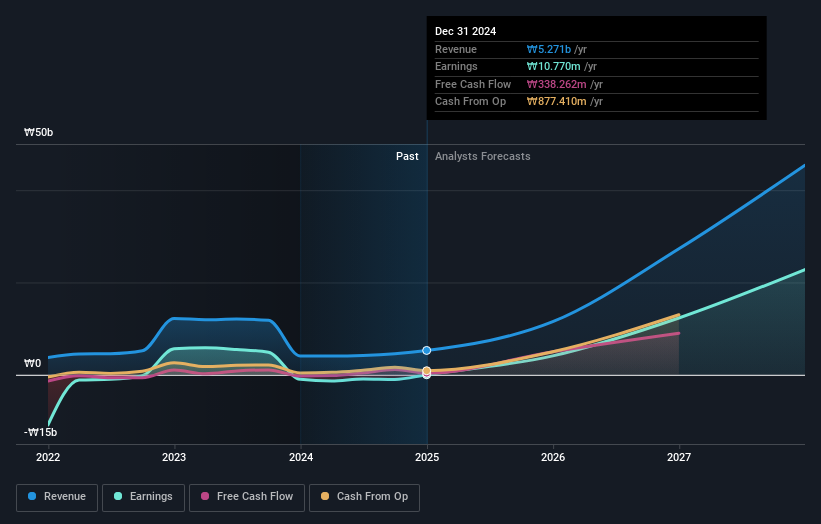- South Korea
- /
- Medical Equipment
- /
- KOSDAQ:A314930
Individual investors who hold 52% of Biodyne Co., Ltd. (KOSDAQ:314930) gained 21%, insiders profited as well

Key Insights
- Biodyne's significant individual investors ownership suggests that the key decisions are influenced by shareholders from the larger public
- A total of 8 investors have a majority stake in the company with 48% ownership
- 47% of Biodyne is held by insiders
A look at the shareholders of Biodyne Co., Ltd. (KOSDAQ:314930) can tell us which group is most powerful. We can see that individual investors own the lion's share in the company with 52% ownership. In other words, the group stands to gain the most (or lose the most) from their investment into the company.
Individual investors gained the most after market cap touched ₩395b last week, while insiders who own 47% also benefitted.
In the chart below, we zoom in on the different ownership groups of Biodyne.
See our latest analysis for Biodyne

What Does The Institutional Ownership Tell Us About Biodyne?
Institutional investors commonly compare their own returns to the returns of a commonly followed index. So they generally do consider buying larger companies that are included in the relevant benchmark index.
Institutions have a very small stake in Biodyne. That indicates that the company is on the radar of some funds, but it isn't particularly popular with professional investors at the moment. If the company is growing earnings, that may indicate that it is just beginning to catch the attention of these deep-pocketed investors. We sometimes see a rising share price when a few big institutions want to buy a certain stock at the same time. The history of earnings and revenue, which you can see below, could be helpful in considering if more institutional investors will want the stock. Of course, there are plenty of other factors to consider, too.

Biodyne is not owned by hedge funds. Looking at our data, we can see that the largest shareholder is the CEO Wook-bin Im with 46% of shares outstanding. With 0.5% and 0.4% of the shares outstanding respectively, Dimensional Fund Advisors LP and Samsung Asset Management Company, Ltd. are the second and third largest shareholders.
On studying our ownership data, we found that 8 of the top shareholders collectively own less than 50% of the share register, implying that no single individual has a majority interest.
Researching institutional ownership is a good way to gauge and filter a stock's expected performance. The same can be achieved by studying analyst sentiments. While there is some analyst coverage, the company is probably not widely covered. So it could gain more attention, down the track.
Insider Ownership Of Biodyne
The definition of an insider can differ slightly between different countries, but members of the board of directors always count. The company management answer to the board and the latter should represent the interests of shareholders. Notably, sometimes top-level managers are on the board themselves.
Insider ownership is positive when it signals leadership are thinking like the true owners of the company. However, high insider ownership can also give immense power to a small group within the company. This can be negative in some circumstances.
It seems insiders own a significant proportion of Biodyne Co., Ltd.. Insiders have a ₩184b stake in this ₩395b business. It is great to see insiders so invested in the business. It might be worth checking if those insiders have been buying recently.
General Public Ownership
The general public, mostly comprising of individual investors, collectively holds 52% of Biodyne shares. With this amount of ownership, retail investors can collectively play a role in decisions that affect shareholder returns, such as dividend policies and the appointment of directors. They can also exercise the power to vote on acquisitions or mergers that may not improve profitability.
Next Steps:
I find it very interesting to look at who exactly owns a company. But to truly gain insight, we need to consider other information, too. To that end, you should be aware of the 2 warning signs we've spotted with Biodyne .
If you are like me, you may want to think about whether this company will grow or shrink. Luckily, you can check this free report showing analyst forecasts for its future.
NB: Figures in this article are calculated using data from the last twelve months, which refer to the 12-month period ending on the last date of the month the financial statement is dated. This may not be consistent with full year annual report figures.
Valuation is complex, but we're here to simplify it.
Discover if Biodyne might be undervalued or overvalued with our detailed analysis, featuring fair value estimates, potential risks, dividends, insider trades, and its financial condition.
Access Free AnalysisHave feedback on this article? Concerned about the content? Get in touch with us directly. Alternatively, email editorial-team (at) simplywallst.com.
This article by Simply Wall St is general in nature. We provide commentary based on historical data and analyst forecasts only using an unbiased methodology and our articles are not intended to be financial advice. It does not constitute a recommendation to buy or sell any stock, and does not take account of your objectives, or your financial situation. We aim to bring you long-term focused analysis driven by fundamental data. Note that our analysis may not factor in the latest price-sensitive company announcements or qualitative material. Simply Wall St has no position in any stocks mentioned.
About KOSDAQ:A314930
Biodyne
Develops and manufacturers medical devices, reagents, and consumables in South Korea.
Exceptional growth potential with flawless balance sheet.
Market Insights
Community Narratives



